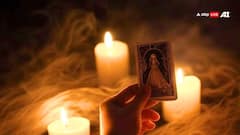Stories From Mahabharat — How Krishna Met The Pandavs The First Time And How He Was Related To Kauravs
Lord Krishna, a cousin to Pandavs, played a pivotal role in their lives. He supported them in their struggles against Kauravs, offering guidance and protection. Krishna was, however, related to both.

Stories From Mahabharat: We have often heard stories of how Lord Krishna was key to the Pandavs' win in the Mahabharat. Krishna had been friend, philosopher, and guide to the Pandav clan for most of their lives. It was Krishna's boon that saved the Pandav lineage after Ashwatthama sought to kill the unborn child of Uttara, the wife of Arjun's son Abhimanyu. Krishna even served as Arjun's charioteer.
But how did Krishna, the Supreme Lord in Hindu mythology, come to be such an integral part of the Pandavs' lives?
The five Pandav brothers, sons of King Pandu, went through numerous trials due to the enmity with the Kauravs, their cousins. The Kauravs were 100 brothers and a sister born to Pandu's visually impaired elder brother Dhritarashtra and his wife Gandhari. The Kauravs, led by the eldest of them, Duryodhan, harboured intense jealousy and animosity towards the Pandavs and schemed to force them into exile. Amid these trials, Krishna, who was a cousin to the Pandavs, emerged as a crucial ally and guide to them.
ALSO READ: Why Krishna Did Not Fight The Kurukshetra War — Stories From Mahabharat
How Was Krishna Related To Pandavs And Kauravs?
Krishna's father Vasudev was the brother of Kunti, the birth mother of the three Pandavs — Yudhishtir, Bheem, and Arjun. Krishna was also the father-in-law to Lakshana, the daughter of Duryodhan. Lakshana was married to Samba, Krishna's son from Jambavati.
ALSO READ ON ABP LIVE | Do You Know There Is A Duryodhan Temple In India? Know Where Is It And What's Special About It
Draupadi's Swayammvar
The first significant meeting between Krishna and the Pandavs took place in the court of Panchal King Drupad. His daughter Draupadi was to choose a husband for herself at a 'swayamvar' (a ceremony where the princess chooses her husband from a group of suitors). The Pandavs, disguised as Brahmins during their exile, too, attended the ceremony.
During this event, Krishna, who was present, recognised the Pandavs despite their disguises. As Krishna and the Pandav looked at each other in silence, they mutually offered each other respect and warmth. It is said that the omniscient Krishna knew that this was a moment that would define the future of Bharat.
Sure enough, Arjun, the third Pandav brother, won Draupadi’s hand in marriage by completing an extraordinary archery challenge — he pierced the eye of a mechanical fish rotating above him by looking at its reflection in the water below.
It was eventually Draupadi's public insult by Dushasan in the that sparked the Kurukshetra battle.
Krishna's support to the Pandavs was instrumental, as he affirmed their legitimacy and prowess in front of the gathered kings and suitors. Krishna’s relationship with the Pandavs deepened over time. His counsel was invaluable, especially to Yudhishthira, the eldest Pandav, known for his righteousness, and Arjun, whom Krishna was particularly fond of. Arjun was among the very few who had been granted the boon to see Krishna in his 'Virat Roop' or 'Vishwaroop' avatar.
On the eve of the great Kurukshetra war, Arjun, standing on the battlefield, was overwhelmed with doubt and moral confusion. Krishna, serving as his charioteer, delivered the profound spiritual discourse known as the Bhagavad Gita (the song of God), addressing the nature of duty, righteousness, and the eternal soul. This discourse strengthened Arjun’s resolve and epitomised Krishna’s role as the divine guide.
The Bhagavad Gita, a part of the Mahabharata epic, is regarded as a guide to a righteous life even today.


































